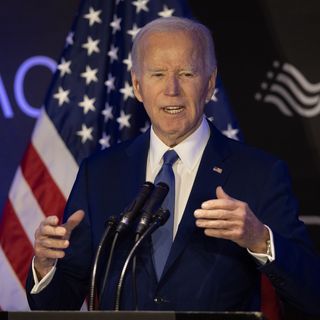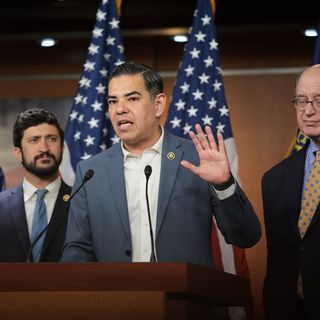Donald Trump is shrugging off the Supreme Court. These are uncharted waters.
AP Photo/J. Scott Applewhite
- The Supreme Court told Donald Trump to bring back a man his administration has deported to a prison in El Salvador.
- It doesn't look like Trump is going to comply — or even try to comply.
- Checks and balances among wings of government are built into the US system. What happens if that breaks down?
The Supreme Court has told Donald Trump to do something. It looks like he's not going to do it.
What happens next?
And by next, I mean two things:
Most immediately: What's going to happen to Kilmar Armando Abrego Garcia, the Salvadoran national the US says it mistakenly deported to a notorious prison in El Salvador?
But really, what's going to happen to the United States?
Because we have entered uncharted waters: The president, who is supposed to govern alongside Congress and the court system, now appears to be acting with next to no constraints.
I don't want to get into the weeds about the Abrego Garcia case, and the US government's conflicting explanations about why it sent him to El Salvador and why it says it can no longer get him back. I also don't want to debate the merits of Trump's mass deportation campaign (I think it's awful; many Americans feel otherwise).
But I do want to underline the big picture: We're supposed to live in a country with a system of checks and balances. And right now things seem very unbalanced. Donald Trump is doing mostly what he wants to do.
Some of what Trump is doing is a super-charged extension of what presidents have been doing for decades — expanding powers originally meant to be at least partially the domain of Congress, and relying on executive orders instead of trying to get congressional sign-off. (Punchbowl News, on Tuesday: "Trump has signed fewer bills into law at this point in his presidency than any new president taking office for the last seven decades, according to government records.")
Ignoring court orders is a completely different ballgame, and a very rare one, as many legal scholars note with increasing alarm. That's why people who say Trump should do that, like Vice President JD Vance, have to go back to an 1832 case to find a precedent.
It may also explain why Trump himself says, repeatedly, that he wants to obey court rulings — particularly from the Supreme Court, as he said last week.
But on Monday, Trump made it clear that he intends to ignore the unanimous Supreme Court ruling telling his administration to "facilitate" the return of Abrego Garcia to the US.
The reasons for that stance depend on who's talking. Sometimes they argue that courts can't compel Trump to do anything that relates to foreign policy, as Secretary of State Marco Rubio said at a Monday press event in the Oval Office. Other times they'll say it's simply up to the government of El Salvador, as Attorney General Pam Bondi said at the same meeting.
In reality, if Trump wanted to comply, he'd simply tell Nayib Bukele, El Salvador's president — who sat next to Trump at the Monday event in the White House — to pull Abrego Garcia out of prison and put him on a plane to the US.
So here we are.
Again: Maybe you don't care much about what happens to Abrego Garcia, or anyone else the Trump administration wants to expel from the country. Maybe you like what Trump is doing.
But if we keep heading down this path, you're eventually going to find a place where Donald Trump wants to do something you don't like. Maybe he'll want to stop a deal you want to do. Something where you'd like Congress, or the courts, to push back, to create a counterweight — the system we set up way back in the 1700s, in place of a king. What happens if we abandon that?



